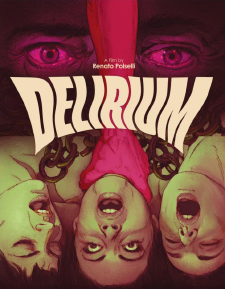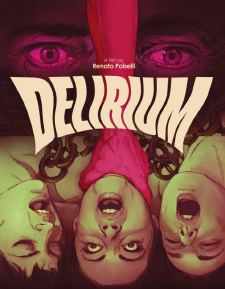Delirium (1972) (Blu-ray Review)

Director
Renato PolselliRelease Date(s)
1972 (August 29, 2023)Studio(s)
Cinamerica International/G.R.P. Cinematografica (Vinegar Syndrome)- Film/Program Grade: C
- Video Grade: A
- Audio Grade: A
- Extras Grade: A
Review
Delirium is one of many Italian films of the 1970s that have lately received Blu-ray release. It falls into the category of giallo, a murder mystery thriller that combines slasher scenes with psychological horror and is overtly exploitative. Directed by Renato Polselli (The Vampire and the Ballerina), the film is a surrealist excursion into madness, sex, and violence.
Dr. Herbert Lyutak (Mickey Hargitay) is an impotent, married psychologist. The sight of attractive young women triggers him into stalking and killing them. His wife, Marzia (Rita Calderoni), has not divorced him, though they have no children, but now is realizing that something, aside from his impotence, is terribly wrong with him.
The revelation that the murderer slaughtering women is Lyutak occurs early in the film, so an important element of the mystery is removed. Director Polselli doesn’t follow the typical template of keeping us guessing as to the killer’s identity. Instead, he presents a bizarre journey in which the viewer is never quite sure when and how Lyutak will strike, what motivates him, and how he will be unmasked, if at all.
Lyutak and Marzia are beset with sexually charged nightmares featuring writhing naked women, torture and sadism, all shown in graphic detail. These scenes are intended to be titillating but may be far too strong for those with fragile sensibilities. Polselli pushes the envelope of taste, going all out to make these scenes a dramatic high point. They are, however, overly long and pose more questions about this odd couple than they answer.
Delirium contains several gruesome murders but the acting is so abysmal that they can’t be taken seriously. Compounding the problem is a sluggish editing pace. Polselli intentionally dwells on the bloody mayhem to compensate for the limitations of his actors and special effects. The script is convoluted and often difficult to follow.
Hargitay’s expressionless face does little to convey what his character is thinking. A former Mr. Universe, perhaps known best for being married to Jayne Mansfield, Hargitay had appeared in many Italian sword-and-sandal action flicks. In those films, he just had to look strong and handle fight scenes believably. But Lyutak is a complex character and Hargitay lacks the skills and/or understanding of the role to play it convincingly. Calderoni is much better as the complex, troubled, frustrated Marzia. Watching the two together is like watching an amateur run lines with an accomplished actor.
The film explores sexual repression and madness with lots of twists and unexpected developments. Some work, others not so much. Polselli keeps the viewer in a constant state of disorientation. When we think we’ve figured out what the film is all about, Polselli pulls the rug out from under us and takes a sharp turn.
Made on a small budget, Delirium puts brutality before coherence, performance, and production values. While many directors incorporate nudity for artistic reasons, Polselli is unapologetic in his embrace of not only nudity, but outright sleaze.
The film played well in Europe and had a limited theatrical release in America. For the American release, scenes of Lyutak serving in Vietnam were inserted to explain his homicidal tendencies and another murder was added.
Delirium was shot by director of photography Ugo Brunelli on 35 mm film and presented in the widescreen aspect ratio of 1.85:1. The Vinegar Syndrome Blu-ray version is newly-scanned and restored in 4K from its 35 mm original camera negative. (The opening credits are in French with the title Sexes en Delire.) The color palette ranges from bold primary colors, especially red, to darker tones. Complexions are nicely rendered, especially those of the women. There’s plenty of female flesh on view and the murder scenes dwell on blood, anguish, and slow death. The opening scene moves from a brightly lit bar to night scenes in desolate locations. Image is sharp and the print has benefited from its restoration. Embedded dirt specks, scratches, and cue marks have been eliminated. Watching the Blu-ray is like watching a brand new print.
Audio is included in Italian 2.0 Mono DTS-HD Master Audio with optional English SDH subtitles. The nightmare sequences include the sounds of chains, struggling, moaning, and driving, intense music by Gianfranco Reverberi. During one of Dr. Lyutak’s stalkings, a young woman runs through a wooded area, and silence plays a significant role in creating suspense. As she crosses a stream, the gentle sounds of the water contrast with her terror.
Bonus materials on the unrated Blu-ray release from Vinegar Syndrome include the following:
- Audio Commentary with Eugenio Ercolani and Troy Howarth
- The Polselli Clan (26:52)
- Fear and Delirium in Cinecitta (31:14)
- The Polselli Factor (14:39)
- Gothic Polselli (12:44)
- The Theorem of Delirium (14:23)
- Alternate American Version of Delirium (85:53)
Audio Commentary – Film historians Eugenio Ercolani and Troy Howarth share this commentary. Renato Polselli is referred to as an “interesting and misunderstood filmmaker.” Polselli had unique cinematic and writing style and was “a genre unto himself.” His films are stylized and deliberate, and he’s often called an inept director. He explores disconnected characters. While directors of the time were trying to imitate major films, Polselli took a different path. Delirium is one of his most personal films. He had a run of successful films in the 1970s that reflect his interest in the fringes of society. Delirium is a giallo, but ultra sleazy in attitude. As the director moved toward sleazier films, old collaborators fell away. Delirium is not a conventional grindhouse movie. Polselli was a safe bet for investors because he never went over budget and filmed quickly. Nobody lost money on Delirium.
The Polselli Clan – In this interview with Vanessa Polselli, daughter of director Renato Polselli, she speaks in Italian as English subtitles are shown on screen. She refers to her father as “one of a kind.” He based his films on reality and things he had witnessed. His films reflect respect for the fragility of people. On family vacations, he would bring along his camera and pose the family methodically against picturesque settings. Ms. Polselli discusses several of her father’s films, noting that he didn’t want her to see those featuring “a great deal of eroticism.” Censorship prevented the distribution of many of her father’s pictures because he “pushed the boundaries.” She discusses his writing methods and how he revised scripts.
Fear and Delirium in Cinecitta – In this archival interview, actor Mickey Hargitay traces his film career back to The Love of Hercules (1960). American International signed him for five movies. He left Los Angeles in 1964 and established himself as a resident of Italy. He was approached to do a Western and was thrilled since, as a kid, he loved American Westerns. He received scripts in Italian and learned a bit of the language but couldn’t understand the full meaning of the script. The Western was successful, so he was cast in he-man and gladiator movies and became friends with many movie stars. He and his friends thought of Rome as “an actor’s graveyard” because it marked the end of careers. He speaks about his role in Delirium and his professional relationship with director Renato Polselli.
The Polselli Factor – Filmmaker/historian Luca Rea discusses the career of his friend Renato Polselli and provides a biographical overview with personal anecdotes. In Rome, Polselli got work writing giallo tales and eventually moved up to directing. He saw Horror of Blood with Christopher Lee, which inspired The Vampire and the Ballerina. Polselli made war movies and comedies as well as Gothic tales. He also worked behind the scenes on many films. Toward the end of the 1960s, he began directing exploitation movies. Rita Calderoni starred in many Polselli films. He made his films on a very small budget. Delirium was “almost a porn movie for the time.”
Gothic Polselli – In this interview, conducted in Italian (with English subtitles), screenwriter Ernesto Gastaldi notes that he started in cinema because it was the only way to get a writing job. Many of Polselli’s contemporaries worked on Westerns and gialli but didn’t feel accomplished. Gastaldi was happy because he had lots of work. He speaks about some of the films he’s written, adding that most earned profits. He also makes a point of praising Renato Polselli’s skill as a director and offers personal insights into various Italian filmmakers he’s worked with.
The Theorem of Delirium – In this archival interview with director Renato Polselli and actor Mickey Hargitay, the two men talk about films they made together. Polselli speaks in Italian, with English translations at the bottom of the screen. Hargitay couldn’t get movie roles for a while because of his heavy Hungarian accent but when he eventually did, he was extremely diligent about preparation. Polselli paid his actors very little, noting, “Big money creates prima donnas.” The director always was calm and carefully explained what he wanted. Both men are generous in their comments about Rita Calderoni, whom they consider a fine actor. Polselli insisted upon respect and professionalism from his crew during the filming of nude scenes. Polselli, not a fan of censorship, points out that the censors don’t speak for themselves but for “the public’s sense of decency.” Hargitay thinks that whatever feeling a viewer takes away from a film is OK, and reflects on an open society where diverse opinions create dialogues.
American Version – A prologue set in Vietnam shows soldier Lyutak amid the horrors of war. These scenes were meant to provide greater motivation for his homicidal activities and mental torment. Some of the more graphic scenes depicting nudity were eliminated or edited. The soundtrack is presented in English 2.0 Mono Dolby Digital with burnt-in Dutch opening and closing credits.
Delirium attempts to illustrate the workings of a deranged mind by combining psychological terror with traditional grind house ingredients. Apart from Calderoni’s performance, weak acting undermines director Polselli’s vision and renders the picture a voyeuristic foray into sadomasochism and the dark side of human nature. It takes patience to make sense of the convoluted plot. This is not a film for everyone. For fans of Italian giallo and slasher thrillers, it touches the required bases.
- Dennis Seuling

